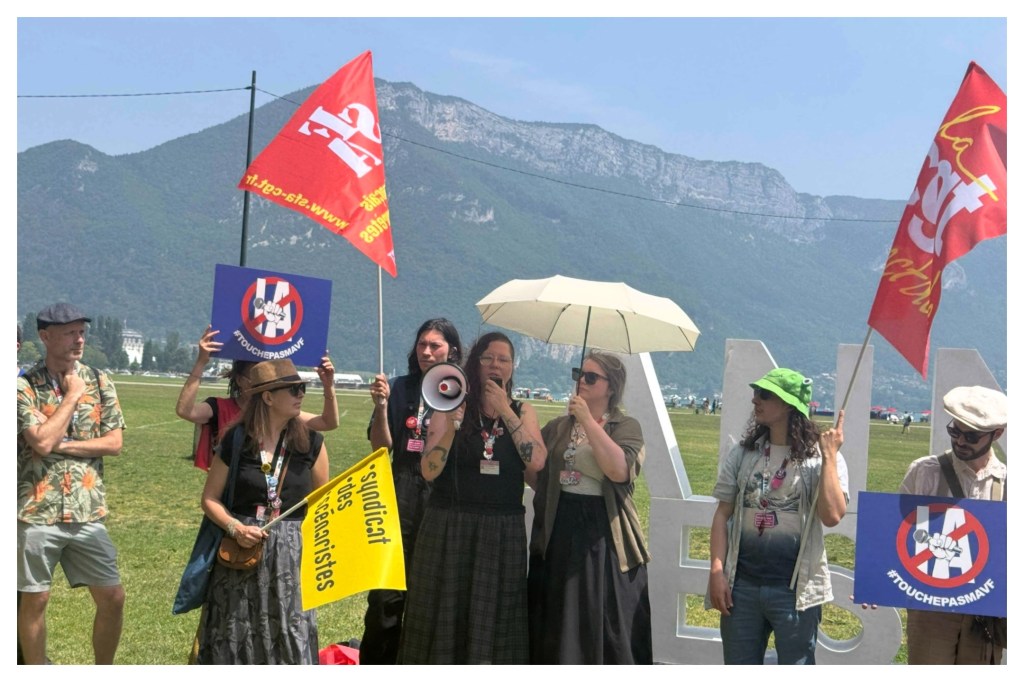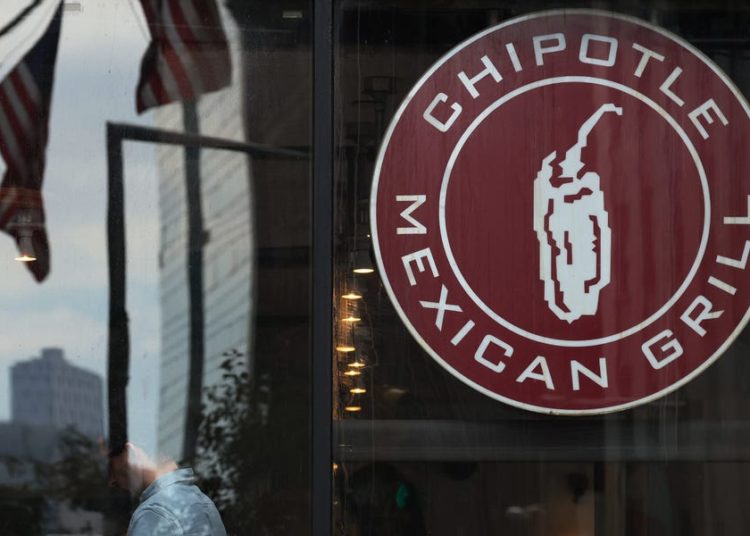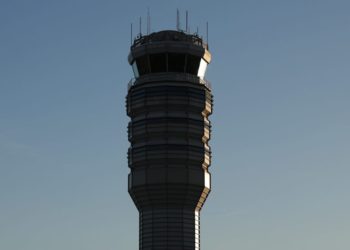Representatives of international animation, screenwriters and actors guilds staged a protest at the Annecy Animation Film Festival on Thursday to voice their fears over the implications of generative AI for their professions and human creativity in general.
Around 150 people joined them on the stretch of grass known as Le Paquier in front of the festival’s key hub of the Bonlieu National Theater, holding guild flags and banners expressing their rejection of AI.
AI and generative AI is a hot button topic at Annecy this year. Many animation professionals are wary about what AI means for their creativity, skills and livelihoods, while a small but growing group is advocating for the sector to embrace the technology.
Belgian-based director, storyboard, layout and background artist Lauri Sanders, who heads up the AI task force at Belgium’s animation workers union ABRACA, read out a statement laying out their concerns and demands. Read the full transcript below.
“Generative AI is neither a tool, nor effective, nor cheap. It is a copying machine that is flawed, destructive and expensive to run. GenAI literally builds upon and draws not only from the copyrighted works it was trained on, but also from the local human cultural values and norms embedded within those works,” read one extract. (scroll down for full statement)
International animation, writers and actors guilds stage anti-Generative AI protest at the Annecy International Animation Film Festival in France: “Generative AI is neither a tool, nor effective, nor cheap. It is a copying machine that is flawed, destructive and expensive to run” pic.twitter.com/2IfDcNFZUm
— Deadline (@DEADLINE) June 12, 2025
It has been signed by more than 20 guilds representing creative professions including the UK’s Bectu, Ireland’s video game org GWUI and animation workers union AWI, America’s The Animation Guild, Netherlands’ Kunstenbond and a number of French bodies including writers’ bodies La Guilde and Syndicat des Scénaristes and animation union SPIAC-CGT.
As well as raising the alarm over the threat posed by unchecked generative AI, the statement also makes demands around consent in relation to work being used to train Generative AI, compensation and control for artists over how their work is then used.
Thursday’s protest and the statement were spearheaded by France’s Les Intervalles, the association against abuse and discrimination in animation.
French actor and animator Milo Hustache-Mathieu and SPIAC-CGT member told the assembled crowd that the protest marked an “historic” event.
“Having a such a coalition right now takes us so high. The whole sector is in crisis and AI is looming over our heads. It’s amazing that, thanks to Les Intervalles, we managed to gather that many associations, unions and organizations from all the around the world,” he said, calling on other bodies to sign up too.
“This danger of generative AI shows the bonds between workers internationally, even if we’re all in different countries and can’t negotiate the same things. We need to bond together. Let’s keep up the fight.”
Speakers from crowd included UK hand-drawn animation specialist and influencer Howard Wimshurst who said the gathering was an important step.
“What we see here with these flags represents something essential. It is not the solution but without it we have no hope and that is solidarity,” he said.
“This year, I’ve seen a lot of films. Luckily there are less AI entries which is good because it means I have to walk out less times but there are panels where you’ll hear people get up on stage and say things like, it’s just a tool, we need to use it, otherwise we’ll be left behind.
“There are speakers here who want to collect their thirty pieces of silver and they will turn on friends they’ve known for years and decades and it’s really sad. Don’t listen to them. They also want to dazzle you with this idea, that it’s all about the technology.
“The technology is a vehicle for exploitation. It’s a vehicle to extract data that people have worked their entire lives to create, they put everything into that data. It’s not just data. Data is such a reductive word, but unfortunately that is how it can be exploited. So don’t listen to them.”
Here’s the full statement:
This statement was composed and supported by a collective of international Animation Unions, federations, and organisations calling for action in regards to the usage of generative Artificial Intelligence and its destructive impact, not only on the global animation industry and the craft itself, but also on everyone who is employed by it, our culture and our planet.
It is an undeniable fact that the animation industry has been suffering greatly these last few years. The economics of streaming have been proven to be not at all lucrative and the increased spending during the pandemic led to the unavoidable burst of the streaming bubble. It is the workers that were staffed up with false promises that are feeling the repercussions through mass layoffs, the increased use of outsourcing, mergers and acquisitions that lead to the closure of studios and ever decreasing budgets.
This echoes across multiple audiovisual entertainment industries and affects workers in animation, music, VFX and the gaming industry.
The rapid expansion of Generative AI in animation is propelled by the perceived beliefs that it is the answer to these developments. To work in these industries is a constant battle to prove our economic worth to a very small number of people, and to those people genAI brings an offer too good to be true: a near magical machine that can produce words and images from a simple and vague description.
Generative AI is neither a tool, nor effective, nor cheap. It is a copying machine that is flawed, destructive and expensive to run. GenAI literally builds upon and draws not only from the copyrighted works it was trained on, but also from the local human cultural values and norms embedded within those works. It poses an immediate threat to creative innovation and renewal, replacing the richness and diversity that characterize human creativity with a creativity shaped by the biases of those controlling and using it. It actively pushes creatives out of their respective industries, which will not only lead to the inevitable loss of knowledge and talent that will never be recuperated fully, but also directly leads to the privatisation of allart process and thinking.
GenAI is a technology that seeks not to support artists, but to destroy them. The absence of humans is a feature, not a bug, of AI art. It is not a tool. We do not “use” genAi – we negotiate with it to try and make it do the things we want it to do. GenAI promises only the loss of employment and livelihood for the millions of people worldwide that work at keeping the world connected through their art.
Unfortunately, the audiovisual industry is not the only victim of this increasingly damaging tech development. This same technology is being used to foster dissent, confusion and distrust among the public and has wide-ranging implications beyond international security, including the fabrication of criminal evidence and news, new forms of sexual harassment including deepfake pornography and/or privacy violations.
The computational power required to train and use generative AI models demands a staggering amount of electricity and water which directly strains municipal water supplies and disrupts local ecosystems. This unchecked growth and unjustified techno-optimism comes with incredible environmental consequences, including expanding demand for computing power, larger carbon footprints, shifts in patterns of electricity demands and an accelerated depletion of natural resources, additionally exploiting without any respect for human rights.
As such, there is a need for protection frameworks around the ethical and fair use of AI. For this we refer to the research brief of the International Labour Organization (ILO) which proposes the concept of “3Cs” (compensation, control on the use of the work of the creator, informed consent), but also for policies, nationally and internationally, to manage workforce transition through skills development, as well as the use of social protection to support workers affected by AI.
Consent: A reasonable balance between on the one hand technological innovation and on the other hand a sustainable and strong cultural and creative sector, requires that training AI with copyright-protected works should only be possible with the (informed) consent of the author(s) of those works.
Compensation: Performers and creators should be fairly compensated for the use of their work including but not limited to illustrations, animations, writing, voicework, likeness, or image, in AI generated content.
Controls: Creators—such as writers, musicians, filmmakers, visual artists, and other professionals—need to be able to govern how their works, identities, and creative inputs are used, adapted, or reproduced by AI systems. This control ensures that the creators’ intellectual property (IP), labour, and reputations are respected and that they receive fair recognition and compensation. In order for this to be realized, creators need to have an understanding on what AI – and particularly GenAI – entails; it is also necessary to build agency among them to negotiate relevant employment conditions.
We call upon the regulators, lawmakers and governments to fight for culture and art and the value it provides, to draft and implement legislation that protects those workers and those rights.
We call upon producers, showrunners, studio heads and production staff to understand and protect our creative culture and to prioritize both the workers and our work.
We call upon all creative workers worldwide to unite. We ask that you support human made works. We ask that you speak up against the implementation of AI. We ask that you become informed and unionise with your fellow workers to protect ourart and culture, our work and our livelihood.
Signed and supported by:
ABRACA (Belgium, animation workers union)AGrAF (France, directors, graphic authors and writers association)BECTU (Broadcasting, Entertainment, Communications and Theatre Union)AWI (Ireland, animation workers union)CNT-SIPMCS (France, press media culture and show union)CSVI (Spain, video game union)FIA (The International Federation of Actors)FIM (The International Federation of Musicians)FNSAC-CGT (France, CGT Federation of Entertainment Unions)La Guilde française des scénaristes (France, writers union)GWUI (Ireland, videogame workers union)Les Intervalles (France, association against abuse and discrimination in animation)Kunstenbond (Netherlands, illustration, comic and animation workers)La Ligue des auteurs professionnels (France, authors union)Syndicat des Scénaristes (France, writers union)SFA-CGT (France, actors dubbing, comedians union)Snam-CGT (France, musicians union)SNTPCT (France, animation and VFX workers union)SPIAC-CGT (France, animation workers union)STJV (France, video game workers union)The Animation Guild (USA, animation workers and writers union)TouchePasàMaVF (France, actors dubbing association against GenAI)Uni MEI (International Art and Entertainment Alliance)
The post Animation, Writers & Actors Guilds Hold “Historic” Anti-Generative AI Protest At Annecy: “GenAI Seeks Not To Support Artists, But To Destroy Them” appeared first on Deadline.




